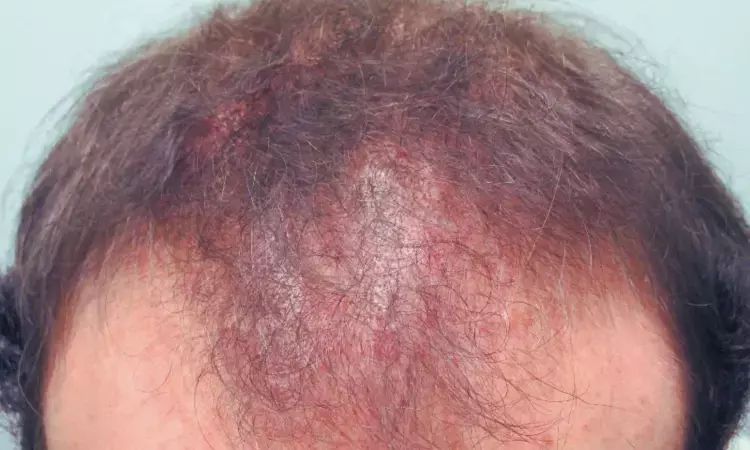- Home
- Medical news & Guidelines
- Anesthesiology
- Cardiology and CTVS
- Critical Care
- Dentistry
- Dermatology
- Diabetes and Endocrinology
- ENT
- Gastroenterology
- Medicine
- Nephrology
- Neurology
- Obstretics-Gynaecology
- Oncology
- Ophthalmology
- Orthopaedics
- Pediatrics-Neonatology
- Psychiatry
- Pulmonology
- Radiology
- Surgery
- Urology
- Laboratory Medicine
- Diet
- Nursing
- Paramedical
- Physiotherapy
- Health news
- Fact Check
- Bone Health Fact Check
- Brain Health Fact Check
- Cancer Related Fact Check
- Child Care Fact Check
- Dental and oral health fact check
- Diabetes and metabolic health fact check
- Diet and Nutrition Fact Check
- Eye and ENT Care Fact Check
- Fitness fact check
- Gut health fact check
- Heart health fact check
- Kidney health fact check
- Medical education fact check
- Men's health fact check
- Respiratory fact check
- Skin and hair care fact check
- Vaccine and Immunization fact check
- Women's health fact check
- AYUSH
- State News
- Andaman and Nicobar Islands
- Andhra Pradesh
- Arunachal Pradesh
- Assam
- Bihar
- Chandigarh
- Chattisgarh
- Dadra and Nagar Haveli
- Daman and Diu
- Delhi
- Goa
- Gujarat
- Haryana
- Himachal Pradesh
- Jammu & Kashmir
- Jharkhand
- Karnataka
- Kerala
- Ladakh
- Lakshadweep
- Madhya Pradesh
- Maharashtra
- Manipur
- Meghalaya
- Mizoram
- Nagaland
- Odisha
- Puducherry
- Punjab
- Rajasthan
- Sikkim
- Tamil Nadu
- Telangana
- Tripura
- Uttar Pradesh
- Uttrakhand
- West Bengal
- Medical Education
- Industry
Lichen Planopilaris Linked to Elevated Risk of Autoimmune, Skin, and Heart Conditions: Meta-Analysis

USA: A comprehensive review and meta-analysis published in the International Journal of Dermatology has revealed that lichen planopilaris (LPP)-a rare, scarring form of alopecia—is significantly linked to a range of comorbid medical conditions, especially autoimmune, dermatologic, and cardiometabolic disorders.
Dr. Maryanne M. Senna and colleagues from the Department of Dermatology at Harvard Medical School, Boston, USA, conducted the study. Their goal was to clarify the associations between LPP and various systemic illnesses, an area previously marked by inconsistent findings.
To provide a clearer understanding, the team performed a systematic review and meta-analysis adhering to PRISMA guidelines. Researchers examined data from multiple databases, including PubMed/MEDLINE, EMBASE, the Cochrane Library, and Web of Science, up until December 25, 2023. Of the 2,535 studies initially screened, 59 met the inclusion criteria, covering a total of 15,178 patients diagnosed with LPP and over 64 million non-LPP controls.
The researchers reported the following findings:
- Individuals with LPP had significantly higher odds of developing lichen planus (OR 15.78).
- The risk of psoriasis is elevated among LPP patients (OR 3.55).
- Rosacea was more common in those with LPP (OR 3.15).
- LPP was associated with a higher risk of melanoma (OR 3.11).
- There was an increased risk of cutaneous squamous cell carcinoma in LPP patients (OR 3.04).
- Systemic lupus erythematosus was more frequently seen in individuals with LPP (OR 3.06).
- The odds of having vitiligo were higher in LPP patients (OR 2.89).
- Rheumatoid arthritis was more common among those with LPP (OR 1.50).
- Hypothyroidism showed a significant association with LPP (OR 1.48).
- Thyroiditis was also more prevalent in LPP patients (OR 1.26).
- LPP patients were more likely to have coronary artery disease (OR 1.66).
- Iron deficiency anemia was slightly more common among LPP patients (OR 1.18).
The authors emphasized that these associations emphasize the need for heightened clinical awareness when managing individuals with LPP. “Our findings suggest that LPP is not merely a localized scalp disorder but may reflect broader systemic immune dysfunction,” the authors noted. They advocated for clinicians to consider comorbidity screening as part of routine care for LPP patients.
Despite the robust methodology, the authors acknowledged the variability in study designs and populations across the included research as a limitation. They called for future studies to better understand the biological mechanisms driving these associations and to help define guidelines for screening and long-term monitoring.
The authors concluded, "The meta-analysis positions LPP as a dermatological condition with important systemic implications, highlighting the importance of multidisciplinary care and early comorbidity detection to improve patient outcomes."
Reference:
Chen, C., Ogbutor, C., Bae, S., Spencer, C., Kelley, K. J., & Senna, M. M. Comorbidities Associated With Lichen Planopilaris: A Systematic Review and Meta-Analysis. International Journal of Dermatology. https://doi.org/10.1111/ijd.17925
Dr Kamal Kant Kohli-MBBS, DTCD- a chest specialist with more than 30 years of practice and a flair for writing clinical articles, Dr Kamal Kant Kohli joined Medical Dialogues as a Chief Editor of Medical News. Besides writing articles, as an editor, he proofreads and verifies all the medical content published on Medical Dialogues including those coming from journals, studies,medical conferences,guidelines etc. Email: drkohli@medicaldialogues.in. Contact no. 011-43720751


